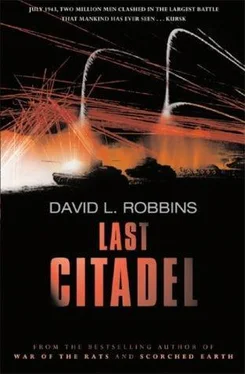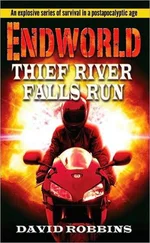With Valentin gone, the gray morn had them sweat to do their work, a sauna under the camouflage netting. Pasha dug into the bins and passed the heavy rounds up through the commander’s hatch. Dimitri hoisted them out of the tank and handed them down to Sasha, who could barely handle the shells’ weight. Still, the boy laid them on the ground in a meticulous way, in rows of five, by ammunition type; he turned red as autumn in the process but never slacked. Dimitri’s muscles drank the exertion, and his worries were submerged in the dampness of the day.
When all the shells were on the ground, the three men lay beside the rounds to gaze into the low scudding roof of cloud. Dimitri lit a cigarette, sensing the wet ground seep into his coveralls and not caring; being clean and dry was something he’d long ago said farewell to. Dimitri smoked, gazing up – the boys were resting -tapping his fingers on his thighs and wanting darkness, another quick dawn, and the following day to come, knowing that it, or the next, would bear the battle with it.
He was fed up with waiting. There wasn’t much more the Soviets could do to fortify the Kursk salient. How many more artillery pieces and tanks and mines and barbed-wire bales can there be left in the world after what had been jammed into these five hundred square miles? How many more times could he flog his tank over the grasses and untended crops to fire at make-believe targets, how long until fate stopped flapping her wings over Kursk and descended to them, to sort them all out one by one? Crouching behind these thick layers of defense, letting the enemy choose the timing of the battle, was making Dimitri edgy. A Cossack was by nature a charger, and this was what the Red Army had become since Stalingrad, pounding the Germans backward, slapping them reeling, back toward Poland and out of Russia. Now, he thought, we wait for the Nazis to call the tune. He sat up and looked south, the enemy lines were thirty miles away. He cast his thoughts over the drab rim of the world, above the heads of the million defenders between him and the enemy, and called the Germans curses in his head: cowards, bastards, godless, anything to anger them and make them come now.
Dimitri stretched out to kick Pasha and Sasha awake.
‘Do you know,’ he asked the boys when they were sitting up and bleary, ‘the difference in these shells? What each one does?’
Both shook their heads, no. Dimitri thought as much; the training these new replacements had been given was – as Valya had said – shit.
‘The heat shells hold a warhead called a shaped charge. Inside the nose-cone here is an upside-down V of explosive.’ With his finger, Dimitri sketched the V on the shell, drawing the line, a mirror image of the point of the shell, so that a diamond was made starting at the tip of the shell. ‘When this hits, the charge ignites,’ and he drew his finger through the center of the diamond toward the tip, ‘and makes a jet of molten metal and superhot gases that will burn a hole through the armor. The crew inside is blinded in the first split second, then everything inside the tank is set on fire.’
‘Everything?’ asked Pasha, blinking, not comprehending what there was inside a tank to burn. There was nothing in there but metal and glass, and a little rubber padding.
‘Yes,’ Dimitri said. ‘Everything, including the air.’
The two boys gaped, wide alert now.
‘Then the ammunition cooks off, and boom!’ Dimitri spread his hands, there was nothing between them but a fiery vision.
Next, he nudged with his toe one of the AP armor-piercing rounds. These, he explained, were solid shot topped with a soft metal cap. When this shell struck, the cap splashed against the armor, giving the hard, sharp metal core a better surface to grip, lowering deflection and improving perforation. Once the arrow-shaped penetrator broke through the armor, it would blast a blizzard of shrapnel over the crew from its own break-up and the hole it drilled in the tank wall.
Pasha and Sasha marveled, only dimly imagining what kind of death one met inside a tank.
‘It’s fast,’ Dimitri said, knowing it was that and much more but choosing only to describe the speed.
Sasha asked, ‘Do the Germans have these?’
Dimitri couldn’t contain his laugh.
‘Yes. Plenty of them. All pointed at us, my boys.’
His other two tank crews had been boys like these, not much better trained, not much brighter, all awed by war and the responsibility they’d been given by Stalin and his mouthy commissars to stop the Germans. The first crew had died in the Cauldron outside Stalingrad, while the Red forces were finishing off the last of the encircled German 6th Army. Some plucky, sneaky bastard jumped up on the tail of the first General Platov and jammed a magnetic mine under the rear overhang of the turret. When it blew, Valya had been standing in his commander’s hatch. He was rocketed straight into the sky like a Roman candle, his clothes shredded and on fire. Dimitri was just as lucky; the turret was lifted right off its ring and he found himself sitting in a convertible tank chassis, watching his smoking son drop out of the sky twenty feet in front of him. Half of the loader beside Valya was still in the turret. The gunner in the seat next to Dimitri had been smashed by the lifting turret. And three months ago, when the Germans retook Khar’kov, the second General had been immobilized after an antitank gun hit one of its treads. Dimitri knew whoever fired it had a bead on them, and they had to bail out in the time it took to reload that gun. He shouted, ‘Get out!’ and flung open his hatch. Dimitri heard the crack of the incoming shell while he dove shoulder to shoulder with his son into a crater. The other two boys were slower. The incomer was a HEAT round fired from a Mark IV no one had seen. The second General rocked, and the tank with its two scrambling boys left inside disappeared in blaze and smoke.
Dimitri said none of this to Pasha and Sasha. The other four boys had their graves, they needn’t be buried fresh inside these two. Instead he handed them both cigarettes. A soldier ambled by carting a wooden crate of bottles, a daily ritual for the Red Army.
Dimitri held out his hand and the soldier filled it with a clear bottle, a hundred liters of vodka stoppered with a cloth cork. Sasha reached for it but Dimitri held it back.
‘The commander gets the first swallow, Pasha. Always. We’ll wait.’
Dimitri laid his back against the wheels of the T-34, making his cigarette glow. The clouds were not parting, the day would be dark. The three of them sucked on their cigarettes and Valentin walked up to the three red dots. Dimitri handed up the bottle. Valya tipped it well, then returned it to Dimitri.
The crew of the General Platov ate a late morning meal, meat hash with black bread, and the vodka. Another ordnance truck came and swapped shells for Valentin, it was the commander’s option to carry into battle what ammo load he preferred. After the truck left, Valya unzipped his coveralls and bare-chested helped reload the bins and racks. Then Valentin ordered them back into the tank for more drills the remainder of the day.
That night, Dimitri was the last of the crew to go to sleep. He sat on the closed hatch above his driver’s seat and watched the stars slip into the sky by degrees. Well into his second pack of smokes, he looked down the line of tanks and saw the breathing embers of other cigarettes, other sleepless men. He noted for the first time there was no traffic going on around him. Not a truck delivered soldiers and supplies, no tank rumbled off on night maneuvers. Nothing more was being done in the short dark hours away from the Germans’ surveilling eyes. The preparations to defend the Oboyan road were finished. He spit and the taste of tobacco was like gunpowder.
Читать дальше












